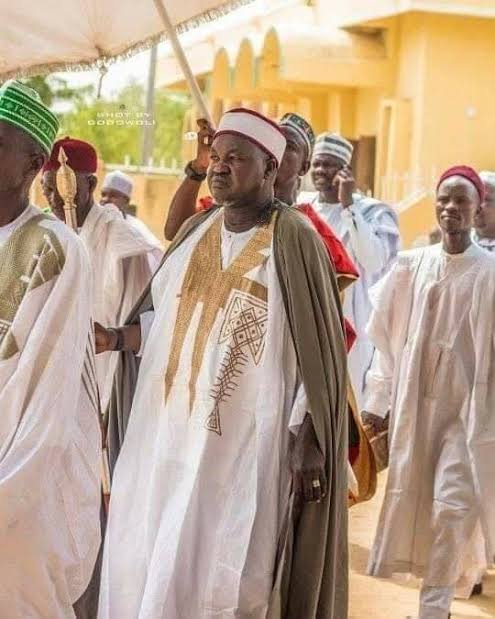The Enduring Spirit of Bade: 20 Years of Pride and Progress Under HRH Abubakar Umar Suleiman
By Muhammad Maitela, Damaturu

For centuries, the Bade Emirate Council has been a proud emblem of bravery, freedom, and cultural resilience in northeastern Nigeria. Nestled in the heart of Yobe State, the Bade Emirate is a community whose narrative is rich with courage, wisdom, and an unwavering sense of identity.
As the Emirate celebrates two decades under the guidance of His Royal Highness, Mai Abubakar Umar Suleiman, its people reflect with pride on a history that has not only shaped their future but has also significantly enriched Nigeria’s cultural landscape.
Historians portray the Bade as fearless guardians of their land, warriors who have consistently stood against oppression and fought to maintain their autonomy. The tale of the Emirate is not merely one of survival; it’s a story of triumph: the victory of culture over conquest, and tradition over time.
Generations of Bade sons and daughters have embraced this spirit of independence with quiet dignity, safeguarding the customs and values handed down from their ancestors. Even today, their songs, folktales, and ceremonies resonate with tales of bravery and sacrifice.
Research into their history and language reveals that the Bade trace their roots back to migrants who traveled from the northern shores of Lake Chad around the 13th century, during the peak of the Kanem-Borno Empire. Another narrative connects them to tribes from the Middle East who migrated to Africa after enduring centuries of conflict and turmoil.
Their journey ultimately led them to what is now Yobe State, where they built a flourishing kingdom amidst the sands and savannas of the Sahel. Their resilience, honed through centuries of migration and warfare, enabled them to adapt and thrive in one of West Africa’s most challenging environments.
Today, the Bade and their close linguistic relatives, the Ngizim, are primarily found around Potiskum, Gashua, Jakusko, and Bursari in Yobe State. Smaller communities can also be found in Jigawa, Bauchi (especially Katagum), and Katsina.
The Bade language is a fascinating Chadic tongue, brimming with expression and a rich history. Even with the tides of modern influences, the Bade people have kept their language alive, passing it down through generations as a proud symbol of their identity.
The history of the Bade Kingdom is both long and colorful. It began in Girgir, later moved to Mutunfu, and ultimately found its home in Gogaram, a name that means “darkness” in the Bade language. Gogaram wasn’t just a place to live; it was a stronghold, designed to fend off invasions and protect the freedom of its people.
Eventually, the kingdom made its way to Gashua, which is now its capital, nestled along the Komadugu-Yobe River. This area is not only fertile but also strategically important, becoming a hub for trade, culture, and political activity.
Historical accounts indicate that the first Bade settlers arrived in their current homeland around 1808, during the Islamic Jihad led by Shehu Usman Dan Fodio, a time that significantly altered the landscape of Northern Nigeria. Since its inception, the Bade throne has seen eleven Emirs, each leaving their unique mark on the growth and reputation of the Emirate.
One of the most notable figures in modern Bade history is Emir Mai Umar Suleiman (1919–1981). He took the throne at just 26 years old, blending education with vision to lead with both wisdom and bravery. A graduate of Kaduna College, he collaborated closely with Sir Ahmadu Bello, the Sardauna of Sokoto, and represented Borno at Nigeria’s 1952 Constitutional Conference.
During his time as Emir, he bolstered the institutions of the Emirate, championed education, and stood up for the rights of his people. His influence extended beyond traditional roles, serving as Deputy Chairman of the Northern Council of Chiefs, Pro-Chancellor of Ahmadu Bello University, and a member of the Nigerian Universities Commission (NUC). With numerous national and international accolades, including OBE, OON, and MP, Emir Mai Umar’s legacy continues to inspire the Bade people.
Today, his son, HRH Mai Abubakar Umar Suleiman, carries on that legacy. Over his 20-year reign, the Emirate has seen a renewed emphasis on education and cultural preservation, and peaceful coexistence among its diverse communities. His Royal Highness, born January 1962, and was turbaned as the 11th Emir of Bade (Mai Bede) on 12 November 2005. He is head of the traditional state of Bade with headquarters in Gashua, Yobe State, Nigeria.
His Highness kicked off his academic journey at Borno College of Basic Studies from 1980 to 1981, before moving on to Ahmadu Bello University in Zaria, where he studied from 1981 to 1983 and earned a Diploma in Insurance. In 2002, he furthered his education at the University of Maiduguri, obtaining an advanced Diploma in Public Administration.
He began his professional career at Africa Bank Nigeria in 1984, then transitioned to Premier Commercial Bank in 1989, and later worked at Yobe State Saving and Loans Bank from 1994 to 1995. His career took a significant turn when he was appointed Chief Accountant for the Governor’s office in Damaturu from 1995 to 1996, followed by a role as Director of Finance and Supply from 1996 to 2005.
On November 12, 2005, he was named Mai of Bade by Yobe State Governor Bukar Abba Ibrahim, following the passing of his uncle, Mai Saleh Suleiman. He also took on the role of Deputy Chairman of the Yobe State Council of Chiefs. He has been a strong advocate for immunization against Polio in the state, collaborating with the World Health Organization to dispel concerns about the vaccine’s safety.
One of the most legendary tales in Bade history is the Battle of Hadejia, led by Emir Aji Lawan Babuje. The Bade army, facing the formidable forces of Emir Maje Buhari of Hadejia, fought bravely and emerged victorious—a story that continues to be shared with pride throughout Yobe.
Even the notorious warrior Rabe, who once instilled fear in the Borno Empire, could not defeat Bade. Their bravery in the face of daunting adversaries remains a lasting symbol of their identity.
Beyond their warrior legacy, the Bade are renowned for their warmth, integrity, and hard work. They cherish peace, diligence, and mutual respect. Arrogance and laziness are not tolerated; instead, self-sufficiency and humility are the hallmarks of a true Bade individual.
From traditional festivals and marriage ceremonies to harvest celebrations and community service, the Bade people hold steadfast to their values while also embracing education and modernization.
The influence of the Emirate reaches well beyond Yobe, with its sons and daughters making significant contributions in national leadership and service. Notable figures include General Alwali Kazir (Rtd.), former Chief of Army Staff; Engineer Buba Galadima, a respected political figure; Dr. Yerima Ngama, former Minister of State for Finance; and Senator Ahmed Lawan, former President of the Nigerian 9th Senate.
The achievements of the Bade people truly reflect their core values of hard work, discipline, and a commitment to the greater good.
From the ancient shores of Lake Chad to the bustling streets of Gashua, the tale of the Bade is one of resilience, unity, and unwavering faith. As the Emirate celebrates its 20th anniversary under the leadership of HRH Mai Abubakar Umar Suleiman, the community stands tall, proud of its rich history, confident in its current journey, and filled with hope for what lies ahead.
The Bade people are a living testament to how culture, when cherished and preserved, transforms from mere history into a vibrant heritage.





